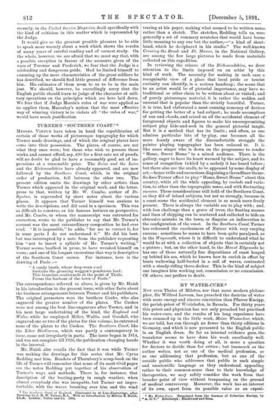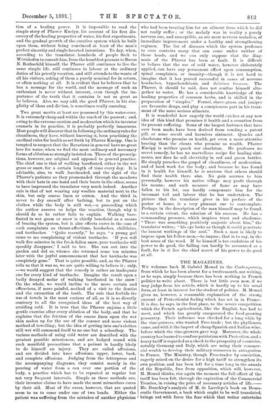MY WATER-CURE.*
NOT even Thales of Miletus, nor that more modern philoso- pher, Sir Wilfred Lawson, has preached the doctrine of water with more energy and sincere conviction than Pfarrer Kneipp, the parish-priest of Worishofen, in Bavaria. For thirty years. this priest and physician has not only preached but practised his water-cure, and the results of his long experience have been summed up in the little work, Meine Wasserkur, which, we are told, has run through no fewer than thirty editions in Germany, and which is now presented to the English public in an English dress. So far as internal evidence goes, the- translator seems to have done his work excellently well. Whether it was worth doing at all, is more a question for doctors to decide than for critics ; but inasmuch as the author writes, not as one of the medical profession, or as one addressing that profession, but as one of the outside public who addresses that public in such simple and unscientific language as they understand, appealing rather to their common-sense than to their knowledge of therapeutics, we may safely consider the work from that broader point of view without trespassing on the ground of medical controversy. Moreover, the work has an interest of its own, apart from its possible value as an exposi- • My Water-Cure. Translated from the German of Sebastian Knipp, by " A. de F." Edinburgh Blackwood and Sons. tion of a healing power. It is impossible to read the simple story of Pfarrer Kneipp, his account of his first dis- covery of the healing properties of water, his first experiments, and the gradual growth of the curative system which he built upon them, without being convinced at least of the man's perfect sincerity and single-hearted intentions. To day, when, according to the translator, hundreds of people flock to WOrishofen to consult him, from the humblest peasant to Baron N. Rothschild himself, the Pfarrer still continues to live the same simple life, still continues to labour at the ordinary duties of his priestly vocation, and still attends to the wants of all his visitors, asking of them a purely nominal fee in return, or often nothing at all. It is evident that he believes that he has a message for the world, and the message of such an enthusiast is never without interest, even though the im- portance of the truth that it contains is not so great as he believes. Also, we may add, the good Pfarrer, in his sim- plicity of ideas and die-ion, is sometimes really amusing.
Two great merits at least are possessed by this water-cure. It is extremely cheap and within the reach of the poorest ; and, owing to the extreme caution and moderation which its inventor counsels in its practice, it is probably perfectly innocuous. Most people will discover that in following the ordinary rules for cleanliness, they have, without knowing it, been practising the cardinal rules for health as set forth by Pfarrer Kneipp. One is tempted to suspect that the Bavarians in general have no great love for water, when we find the most ordinary and necessary forms of ablution so strongly insisted on. Three of the prescrip- tions, however, are original and opposed to general practice. The chief one is that of walking barefooted, either in the wet grass or snow, for a certain length of time every day. It is advisable, also, to walk .bareheaded, and the sight of the Pfarrer's patients as they promenaded through the meadows with their hats in one hand and their boots in the other, seems to have impressed the translator very much indeed. Another rule is that of not wearing any woollen material next to the skin, but only coarse linen or cotton. And the third is, never to dry oneself after bathing, but to put on the clothes while the body is still wet,—a proceeding which the author assures us helps the reaction, though why it should do so he rather fails to explain. Walking bare- footed in wet grass or snow is chiefly beneficial as a means of bracing the system, but it also effects cures in the case of such complaints as throat-affections, headaches, chilblains, and toothaches. " Quite recently," he says, " a young girl came to me complaining of violent toothache. If you will walk five minutes in the fresh-fallen snow, your toothache will speedily disappear,' I said to her. She ran out into the garden and did so, whence she returned some ten minutes later with the joyful announcement that her toothache was completely gone." That is quite possible, and, as the Pfarrer tells us that it was so, we are quite willing to believe it ; only, —we would suggest that the remedy is rather an inadequate one for every kind of toothache. Imagine the result upon a badly decayed molar of walking barefooted in the snow ! On the whole, we would incline to the more certain and efficacious, if more painful, method of a visit to the dentist and the extraction of the tooth. The rule that forbids the use of towels is the most curious of all, as it is so directly contrary to all the recognised ideas of the best way of avoiding cold. It is true that the Pfarrer enjoins a little gentle exercise after every ablution of the body, and that he explains that the friction of the coarse linen upon the wet skin makes up for the use of the coarser and more violent method of towelling ; but the idea of getting into one's clothes still wet will commend itself to no one but a schoolboy. The various methods of using cold water are described with the greatest possible minuteness, and are hedged round with such manifold precautions that a patient is hardly likely to do himself an injury. They are called affusions, and are divided into knee affusions, upper, lower, back, and complete affusions. Judging from the letterpress and the accompanying diagrams, they consist merely in the pouring of water from a can over one portion of the body, a practice which has to be repeated at regular but not very frequent intervals. Simple as these methods are, - their inventor claims to have made the most miraculous cures by their aid. Most of the cures, however, that are quoted seem to us to come under one of two heads. Either the patient was suffering from the mistakes of another physician who had been treating him for an ailment from which he did not really suffer ; or the malady was in reality a purely nervous one, and susceptible, as are most nervous maladies, of immediate improvement under a healthy and strengthening regimen. The list of diseases which the system professes to cure contains many that can come under neither of these heads, and we can only suppose that the diag- nosis of the Pfarrer has been at fault. It is difficult to believe that the use of cold water, however elaborately applied, can have any permanent effect upon consumption, spinal complaints, or insanity—though it is not hard to- imagine that it has proved successful in cases of nervous• headaches, hypochondriasis, and delirium tremens. The Pfarrer, it should be said, does not confine himself alto- gether to water. He has a considerable knowledge of the healing properties of common herbs, and is skilled in the preparation of " simples." Fennel, shave-grass, and juniper are favourite drugs, and play a conspicuous part in his treat- ment of the more serious ailments.
It is wonderful how eagerly the world catches at any new idea of this kind that promises it health and a cessation front its present suffering. Some of the largest fortunes that have ever been made, have been derived from vending a patent pill, or some occult and harmless ointment. Quacks and charlatans who promise us health, get even a more attentive hearing than the cheats who promise us wealth. Pfarrer Kneipp is neither quack nor charlatan. He professes no secret remedy, be has no marvellous recipe for healing oint- ments, nor does he sell electricity in red and green bottles. He simply preaches the gospel of cleanliness, of moderation, and of hard work for the body ; and because he has found in it health for himself, he is anxious that others should find their health there also. No gain accrues to hint personally, however his native village may profit through his means ; and such measure of fame as may have fallen to his lot, can hardly compensate him for the incessant toil and labour that he has undertaken. The picture that the translator gives in his preface of the pastor at home, is a very pleasant one to contemplate. Perhaps in the description of the man himself may be found, to a certain extent, the solution of his success. He has a commanding presence, which inspires trust and obedience. " There was something positively majestic about him," the translator writes ; " his eye looks as though it could penetrate the inmost workings of the soul." Such a man is likely to impose upon his fellow-men,—to impose, that is to say, in the best sense of the word. If he himself is too credulous of his power to do good, the failing can hardly be accounted as a fault, for in it lies the chief secret of his power to do good at all.



















































 Previous page
Previous page